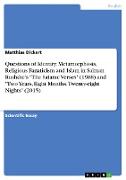Questions of Identity, Metamorphosis, Religious Fanaticism and Islam in Salman Rushdie's "The Satanic Verses" (1988) and "Two Years, Eight Months, Twenty-eight Nights" (2015)
BücherAngebote / Angebote:
Scientific Essay from the year 2016 in the subject English Language and Literature Studies - Literature, Comenius University in Bratislava (Englische Literatur), language: English, abstract: This paper is about Salman Rushdie and two of his major works. The approach to work on "The Satanic Verses" and his latest publication "Two Years Eight Months and Twenty-Eight Nights" (2015) tries to (critically) reflect Rushdie's development as a writer within the time span of almost three decades.
Twenty-seven years for a writer and his community might be an eternity since the world has tremendously changed since then. Rushdie himself, however, in both novels sticks to major themes of his interest. Among them are the parameters used here. Identity, metamorphosis and (religious) fanaticism can be found in both novels and it is the focus on these three which will be central here.
To do so not only helps to reflect major literary topics Rushdie is concerned about it also shows the development these matters have taken within Rushdie' s literary work and the world it reflects. In is exactly the historical framework which Rushdie uses which helps to understand his literary attempt because he said in an interview with the German magazine "Stern" in 2015 that he understands himself as an author who lives in a certain period of time and who therefore has to write about it. The dualistic concept that links the narrative in both novels analysed here must also be seen in this historical framework. Rushdie sees modern man in a globalized world as homeless, hybrid, bound to metamorphosis, caught between the rational and the irrational yet open for positive options which he can choose provided he uses his freedom. So identity, metamorphosis, religion and fundamentalism are closely connected to personal freedom and it will thus be interesting to see how Rushdie's ideas have been worked into both novels.
The structure of this book is therefore as follows: A first part will consist in some sort of background information on Rushdie and his position in contemporary English literature. A second major part will consist in a short introduction of the postcolonial setting. This helps to place Rushdie's work in a literary background. A next step lies in a closer analysis of chosen parameters such as the use of the hybrid Islamic spirituality, transcendence, identity formation, failure and powerlessness. The next important step lies in a close interpretation of both works. This will be followed by an outlook.
Folgt in ca. 10 Arbeitstagen
